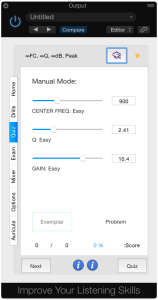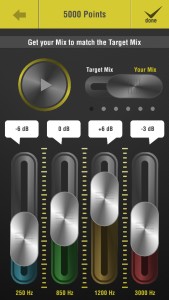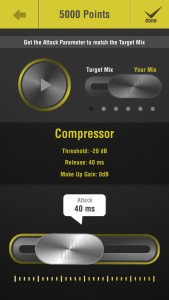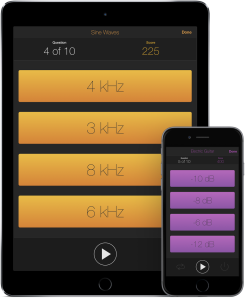The Best Ear Training Apps for Producers, Engineers & Recording Musicians
For most engineers, the ultimate goal is to be able to “feel” their way through a mix, and to do their work in a completely natural and intuitive way.
Much like professional musicians, who often transcribe great solos with the hope that in time, that conscious effort will lead to improvements that creep out unconsciously in their playing, engineers can use intentional critical listening drills to dramatically improve their instincts and skills.
I have personally become a much better mixer since I began teaching critical listening 4 years ago. Working with these drills on a weekly basis reminds me of what sonic real-estate we have to work with and today, I feel I am much more in-tune with my room, my speakers and my auditory system.
In short, my instincts have become stronger, much like my solo’ing skills on bass improved after transcribing so many of the greats. Now, when I’m mixing, I’m feeling the music and experiencing it more closely than ever. Once again, conscious effort has strengthened my unconscious “intuition”.
It’s easy to argue that the hands-on-experience of mixing real recordings is the best teacher. Sure. And you could also argue that best place to improve at any sport is out onto the field. But that doesn’t mean that well-designed drills shouldn’t serve a major role improving your abilities.
With this kind deliberate practice, you can more quickly and effectively improve your craft and your main instruments as an engineer: Namely, your ears, and your ability to listen.
Fortunately, in the last five years a tremendous amount of software development has been made for the purposes of professional ear training. We’ll take a closer look at three of the best programs on the market and compare what they have to offer:
Improve Your Listening Skills by Auricula
“Improve Your Listening Skills” works as an AU plugin for your DAW, or as a standalone iOS app for your iPhone or iPad. It offers several “Drills” that fall into three categories:
The first is “Absolute Identification” which gives you a finite number of choices and prompts you to select the exact answer.
The second, “Relative Comparisons”, presents you with a sonic change, and asks you to determine whether a specific parameter has been increased, decreased or gone unaltered.
The third mode is “Manual”, in which you are presented with a change in sound, and then have to adjust the proper controls to emulate the sonic property of the original.
Auricula is designed to help you improve your ability to identify changes in eight areas: Gain, Compression, Stereo Imaging, Time Delay, Distortion and Noise, Reverb, and last but not least, Timbre, by boosting or attenuating critical frequencies in 10 or 30-band mode.
This App can be downloaded to your iOS device, Andriod and your Mac or PC, and the cost for all three of these licenses is just $14.99. Tutorial videos on installing and using these apps can be found on the Auricula site. I have personally used is software to teach my classes at The New England School of Communications, and have seen great success with my students.
Studio Ears 2.0 is available as an iOS app for iPhone and iPad devices only. I love the layout and interface of this app in particular.
The goal of Studio Ears 2 is to “help you train your ears to improve your music mixing and mastering skills”, and “get decent practice in rhythm and harmonics.” With the app, you can get your hands onto a compact graphic equalizer or compressor, and adjust them to make your own mix match a target mix, listening closely to help maximize your score.
The Studio Ears app has three sections: “Know Your Frequencies” (pretty self-explanatory), “Theory” (even for non-musicians, critical listening is not just about hearing levels and frequencies, but hearing pitch/timbre, rhythm and harmony!) and “Tools” (which includes a handy BPM Tapper, Sine Tone Generator and a Metronome.)
The aural tests are further broken up into three categories: “Frequency Training”, “Dynamics and Effects” and “Rhythm & Harmonics”.
The Frequency Training section has two modules: the “Frequency Quiz Unit” and the “Equalizer Control Unit”. In the former, you listen to changes and choose the correct frequency, and in the latter, you get your hands on an in-app EQ and make the right adjustments for yourself.
The Dynamics and Effects section includes a “Volume Mix Unit” where you can manipulate faders to get the volumes of multiple sounds to fit the target mix relationships; a “Compressor Attack Unit” that includes training to identify attack times in milliseconds, and a “Reverb Intensity Unit” which calls on you to adjust reverb intensity to the target in a mix.
Lastly, the Rhythm & Harmonics section helps you to learn or improve your ability to distinguish between scale types, chord qualities, intervals, rhythmic patterns and BPMs.
The App also includes a nifty suite of tools that are I have certainly found useful: An on-board BPM tapper, tone generator and metronome allow you to continue on with these ideas in a free-form fashion… and could even help save the day in a recording session, rehearsal or live date!
Although I think there is a lot to “gain” from this app I have just two gripes: The first is that there is no Mac/PC desktop version. And the second is that Studio Ears 2 only uses 4 frequency choices when drilling frequency bands. Perhaps in the future, they could design a 10 critical band drill like the ones found in Dave Moulton’s classic “Golden Ears” training books and CDs. Still, this is a very affordable and feature-rich app running at just $6.99
Quiztones is an especially streamlined and attractive-looking app that can be used on iPads, iPhones, Macs and Andriod devices. The developers have created a game-like program that offers a ten-question “quizzes” in three categories: Tones, EQ and Gain.
The “Tones” category, which helps you learn to identify frequencies, is where Quiztones really shines. In this category, you have two settings to try: “Easy”, which draws from tones separated by at least an octave, and “Expert” which refines your ability by playing 1/3 octave tones.
Both the EQ and Gain modes offer a number of sources to use in your drills, and you can also use music from your iTunes in these quizzes. Difficulties once again range from “Easy” to “Expert”. These quizzes help your learn to identify boosts and cuts in EQ and level with music that is relevant to you, or using the built-in material.
Prices for Quiztones range from $4.99 for mobile devices to $9.99 for the Mac desktop.
Summing it Up
I found all three apps to be inexpensive, easy-to-operate tools for critical listening development. In the hustle and bustle of today’s world, these convenient apps offer an accessibility that hands-on studio recording can’t provide. With these apps, you can practice anywhere: Even standing in line at the grocery store or on a daily commute.
One thing I would like to see added to both Studio Ears and Quiztones would be the option of comparing the original sound to the altered audio in their quizzes. In its quizzes, Auricula does give you the option of immediately changing back to the unaltered signal for 1, 2, 3, or 4 second comparisons. For someone that is just starting out, this could provide a stronger learning experience, and perhaps, a faster way to get familiar with the variables in the quizzes.
Otherwise, I do not think one app is hands-down better than any other—they all are great offerings with their own twist. Like many things in life, I recommend trying them all to find out what feels right to you!
(PS—Have your own favorites? Tell us all about them in the comments below!)
Wells Gordon is a bassist, audio engineer and educator who lives and works in Maine.
For more great insights into both mixing and mastering, try our full-length courses with SonicScoop editor Justin Colletti, Mixing Breakthroughs and Mastering Demystified.


Please note: When you buy products through links on this page, we may earn an affiliate commission.











Mark Bassett
September 3, 2015 at 8:23 pm (10 years ago)I’ve listed some of my favourites including Jason Corey’s Technical Ear Training, Harman’s How to Listen (both free) here http://audio.education/tet.html
Samuel Loy
March 9, 2017 at 10:44 pm (8 years ago)Being on Android I downloaded both the Quiztones and the “Improve your listening Skills” app and I was pleasantly surprised to find that the price has dropped on both of them, but I was not pleased by either app. “Improve your listening…” gives little explanation for anything, and Quiztones is good but limited in scope. So I went searching on the play store and to my greatest surprise I found “Studio Ears 2.0” for $4.99, I tried the free trial and loved it, I will be using this a lot!
Mark Bassett
July 4, 2017 at 1:22 am (8 years ago)SAE Parametric Equaliser Training – it’s free, Mac-only and designed to teach users to identify the centre frequency of a parametric equaliser applied to any imported audio files. Download from http://technicalear.training/
Elron Bumquist
December 22, 2017 at 4:56 am (7 years ago)It’s great – I fully recommend! I can’t find a way to save any progress however, but still a very useful app.